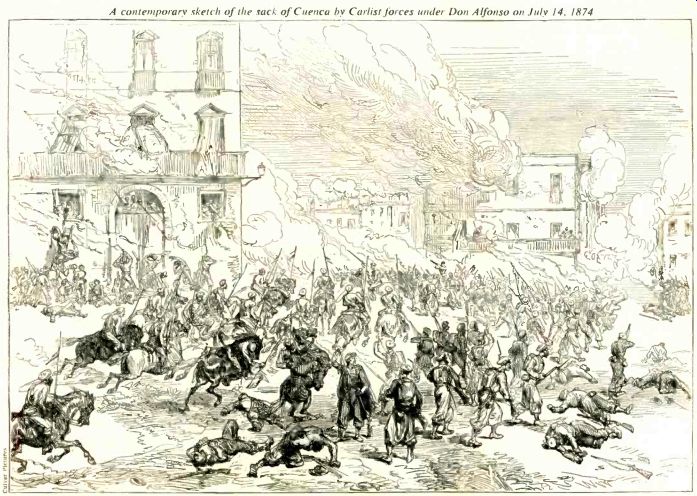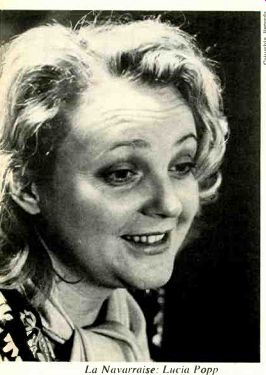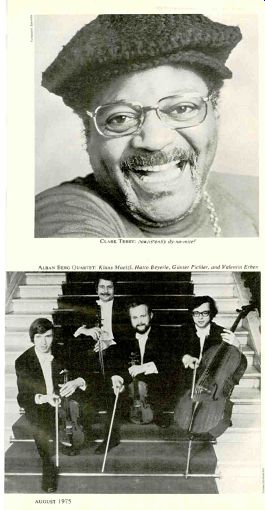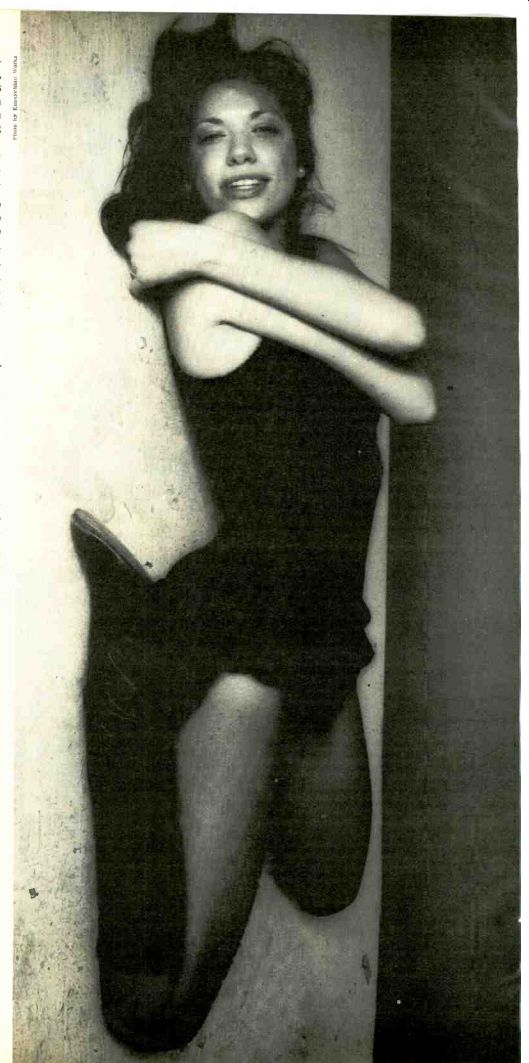STEREO REVIEW'S SELECTION OF RECORDINGS OF SPECIAL MERIT---BEST OF THE MONTH
Massenets La Navarraise: Designed Not to Charm But to Clobber
JULES MASSENET'S brief two-act opera J La Navarraise was produced in Lon don on June 20, 1894, following closely upon the Paris premiere of his more celebrated Thais on March 16. But what a difference those three months made! Thai's, sentimental, perfumed, and sensuous, continued the pattern Masse net had so successfully exploited in his Herodiade (1881), Manon (1884), and Werther (1892), while La Navarraise, brief, tragic, almost brutal, was clearly a Gallic response to the challenge of verismo. Its concentrated action presents a passionate story: a girl commits murder to get her man, but the desperate act proves futile--her lover dies and she loses her mind. All this happens in some thing like forty minutes, and it may fairly be said that, unlike previous Massenet operas, La Navarraise was designed not to charm its audiences but to clobber them.
Contemporary criticism, apparently unable to accept such atypical subject matter from the hand of Massenet, made rather too much of the opera's alleged "noisiness," its trumpet calls, gun shots, ringing bells, and the like. Since La Navarraise is a wartime story (one of nineteenth-century Spain's numerous civil wars), these effects are hardly over done, being instead quite logical tools for a composer bent on embracing the new operatic realism. And, too, Massenet accomplished skillfully what he set out to do: La Navarraise is not, perhaps, a masterpiece, but simple though it is, it is yet powerfully effective, most particularly in its verismo aspect: brief moments of tenderness set in a whirling sea of passion, tragedy, and human stupidity.
Columbia has scored a coup with the first complete recording of this opera.
The music is paced very effectively by…

-------- A contemporary sketch of the sack of Cuenca by Carlist forces
under Don Alfonso on July 14, 1874

-------- Navarraot Lucia Popp
… conductor Antonio de Almeida: there is evident tension, but no effect-seeking vulgarity. The principal roles have not, I think, been ideally cast, but all the singers are good and they do their professional best nonetheless. The role of Anita, the Navarraise of the title, calls for a voice more robustly dramatic than that of Lucia Popp, for example (Emma Calve created the role in London, Paris, and New York; Geraldine Farrar interpreted it in a Met revival of 1921). But though much of the music lies below Miss Popp's most effective range, she manages to cope with its dramatic requirements admirably. Again, tenor Alain Vanzo is fine in the love scene, but his part, too, seems to demand a sturdier, more ringing sound. The same is true of the role of the Spanish general Garrido: Pol Plancon and Leon Rothier were its interpreters at the old Met-true basses both-but Vicente Sardinero, an able light baritone, here sounds a bit uncomfortable with the tessitura at times.
Gerard Souzay and Michel Senechal both contribute fine, idiomatic characterizations, and the recording's technical qualities-excellent sound and vivid theatrical presence-are distinct production values. All in all, a worthy, useful addition to the opera catalog.
Lawrence W. Haward observes in the 1954 fifth edition of Grove's Dictionary of Music and Musicians that Massenet, "with all his skill as a composer ... was strictly confined by a temperament of narrow range, so that to have heard ‘Manon' is to have heard the whole of him." (Mr. Haward himself, evidently, had not heard "the whole" of Massenet: La Navarraise is not even listed in his article.) It is perhaps impossible from this distance to discover whether such a statement is hurried, ill-informed, or simply prejudiced on the part of its author, but it is at the very least insulting to the French (and other) audiences who listened to Massenet works with pleasure both before and after 1884. Such Olympian disdain perpetuated in standard reference works is intellectual mis chief, closing doors too quickly, peremptorily, and unfairly on a posterity that has a right to its own judgments.
It is heartening, therefore, to find that modern tastes-or perhaps even mere curiosity-are opening at least this door again. There is certainly more to Masse net than Manon, and the current revival of interest in some of his neglected works will enable modern audiences to reach their own conclusions as to just how much more. These manifestations include, for the record, last year's Therese from London, this Navarraise (and another to come soon from RCA), the Esclarmonde produced last year in San Francisco (it is also scheduled for recording by London soon), the recent RCA Thai's, and another to come in time from Angel--it will be based on a 1976 production to be mounted for Beverly Sills and Sherrill Milnes first in San Francisco and later at the Met.
- George Jellinek
MASSENET: La Navarraise. Lucia Popp (soprano), Anita; Alain Vanzo (tenor), Araquil ; Gerard Souzay (baritone), Remigio: Michel Sinechal (tenor), Ramon; Vicente Sardinero (baritone), Garrido; Claude Meloni (baritone), Bustamante. Ambrosian Opera Chorus; London Symphony Orchestra, Antonio de Almeida cond. COLUMBIA M-33506 $6.98.
The Alban Berg Quartet Plays Haydn with Traditional Warmth, Contemporary Crispness
IT may seem odd for Haydn quartets to be performed by an ensemble bearing the name of Alban Berg, but the European tradition of naming such per forming groups for composers (for example, the Sibelius Quartet in Finland, the Dvorak, Smetana, Janacek, and Novak quartets in Prague, the U.S.S.R.'s Beethoven and Borodin quartets) has seldom been a delimiting factor in terms of repertoire. What the youngish members of the Alban Berg Quartet did commit themselves to do when they banded together in Vienna was to include a work of Berg, Schoenberg, Webern, or a con temporary composer in every one of their programs.
Significantly, before making their public debut as a unit in 1970, violinists Gfinter Pichler (a former Vienna Phil harmonic concertmaster) and Klaus Maetzl, violist Hatto Beyerle, and cellist Valentin Erben spent a year in the United States studying with the La Salle Quartet, the Cincinnati-based group so admired for its authoritative interpretations of the works of both Viennese schools. This combination of Viennese and American influences has been a happy one, to judge from the Berg Quartet's new Telefunken disc of Haydn's Horseman and Emperor Quartets. Neither work has been more effectively set forth in a recording known to me, and most certainly not in any other available at present.
The playing here is as crisp and clean as one would expect from specialists in contemporary material, yet free of the "antiseptic" quality such specialists of ten display. At the same time it is filled with the warmth and affection one associates with the most revered interpreters of the Viennese classics, yet never veers in the direction of sentimentality. Clearly the Alban Berg Quartet has managed to soak up tradition in a productively selective way, learning from it without being bound by it.
All the tempos in the Emperor are on the brisk side, and the work benefits enormously, especially in the two inner movements; the variations have real dignity here, and the often languid sounding Menuetto springs to life with a freshness that can still be astonishing even in Haydn. The finale may seem a shade too brisk, but in the context of the whole it is a convincingly joyous conclusion. The realization of the Horseman is sheer perfection, combining the gutsy vigor of the Griller version with the suave polish of the Fine Arts and adding a large element of affectionate under standing in the glorious slow movement such as has barely been hinted at since the Budapest Quartet's short-lived re cording of some thirty years ago. Here the outer movements are conventionally paced, their strength lying in the rock-firm rhythm and eloquent phrasing; this performance alone would make the disc indispensable.
Telefunken has provided first-rate sonics and has used a gatefold container in order to provide elaborate notes in three languages; unfortunately, the English translation of Ludwig Finscher's German original is inept, but this is the only blemish on a really superb production, a major addition to the swelling Haydn discography. Richard Freed HAYDN: String Quartet in G Minor, Op. 74, No. 3 ("The Horseman"); String Quartet in C Major, Op. 76, No. 3 ("The Emperor"). Alban Berg Quartet. TELEFUNKEN SAT 22550 $6.98.

----- CLARK TERRY: dy-no-mite!
---- Alan Berg QUARTET: Klaus Maetzl. Hatto Beyerle, Gunter Pichler. and V. Erben
Clark Terry: Superb Big-Band Playing by a Somewhat Neglected Master
CLARK TERRY is one of the most reliable and (therefore?) one of the busiest players in jazz. He also happens to be a man of extraordinary talent and, as evidenced in his new Vanguard album, great wit. He was a member of the To night Show band for many years, but al though he had a great deal more to say than most of the guests on that show, neither camera nor microphone ever gave us more than a hint of his presence.
Now, a little late, we get a chance to hear some of what we missed. Recorded during a concert at the Wichita Jazz Festival in April of last year, the album faithfully reproduces over forty-three minutes of a superb big band playing fine arrangements by such talents as Phil Woods, Jimmy Heath, and Ernie Wilkins, the whole neatly and humorously MC'ed by Terry, complete with hilarious impersonations of . . . Lawrence Welk and Muhammed Ali.
Terry's version of Mumbles here, his big hit of several years ago, is different from any rendition I have heard him do and funnier by far than any number of so-called comedy records. Add to this a string of memorable solos and you have one of the finest albums released so far in this year 1975. I won't single out any track: I couldn't--the album is consistently dy-no-mite! Chris Albertson CLARK TERRY: Clark Terry's Big B-a-d Band Live. Clark Terry (trumpet, flugelhorn, vocal); Jimmy Nottingham and Richard Williams (trumpets); Jimmy Heath, Ernie Wilk ins, Phil Woods, and Charles Davis (reeds): Duke Jordan (piano): Wilbur Little (bass): orchestra. Una Mas; Nefertiti; Take the "A" Train; Randi; Mumbles; Sheba; Cold 'Tater Stomp. VANGUARD VSD 79355 $6.98.
A Thoughtful Report From the Home Front By Investigator Carly Simon
CARLY SIMON'S new album "Playing Possum" for Elektra is an intelligent, mind-warming romp and an almost continuous musical joy. The candid cover photograph of Carly has caught her in an abbreviated chemise in a way that makes her look like a sexy grasshop per. all long white arms and longer legs, proving that her various parts are as nicely matched as the songs in the album are: she has gotten her head together, in 1975 terms, better than any other young female composer-performer around.
The sexual revolution? Put such pedestrian back-numbers out of your mind.
Carly has clearly moved beyond all that.
Listen to her in Look Me in the Eyes: "It's your heat that makes me warm/ Makes me climb on you like a tree / And I don't need no fancy dancing/ When you bend over me." Hm. Quite frank, as we used to say, but also as clear-eyed, healthily straightforward, and up-to-the-minute as can be for an honest woman dealing with these matters today.
Slightly more ambivalent is her approach to the Lib game in Slave: I worship your opinions/I imitate your ways/I try to make you grace me/With a word of praise/However much I tell myself/That I'm strong and free and brave/I'm just another woman/Raised to be a slave." "Raised" is the key word, of course, but the song is a statement of fact, how things are, and not a cry of impotent rage. The point is that it's all role playing; we cannot choose no role, but we can choose among the number available, even the one called the path of least resistance. And choice is not without its dangers too, according to Carly (and Jacob Brackman) in Attitude Dancing--"Find a role you like/Capture it and freeze/Then turn it around/A hundred and eighty degrees"--for even choosing can become a habit, a role, condemning the player to a life of confused, direction less (even though self-manipulated) jostling. The best song here, however, is the title song, Playing Possum. It's about whatever happened to The Revolution, it echoes with little whispers of frustrated cultural possibilities, perhaps sinister, perhaps pathetic, and it will make you think.
Production is by Richard Perry, and it is superb--as well it ought to be for an album that at least temporarily sums up a number of current social conundrums better than might any learned dissertation by one of the paper pundits of the media. And anyway, no one of them sings as well as Carly Simon Taylor.
Peter Reilly
CARLY SIMON: Playing Possum. Carly Simon (vocals): other musicians. After the Storm; Live Out in the Street: Look Me in the Eyes; More and More; Slave: Attitude Dancing; Sons of Summer; Waterfall; Are You Ticklish: Playing Possum. ELEKTRA 7E-1033 $6.98, ET8-1033 $7.98, TC5-1033 $7.98.

-------- Carly Simon right side up; for the camera-eye view, rotate
90 degrees counterclockwise.
==============
Also see: